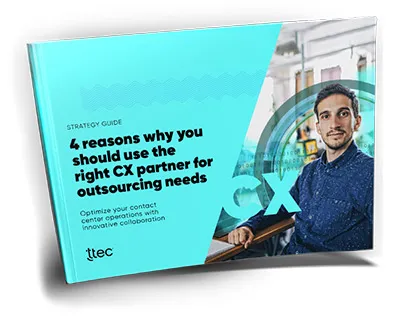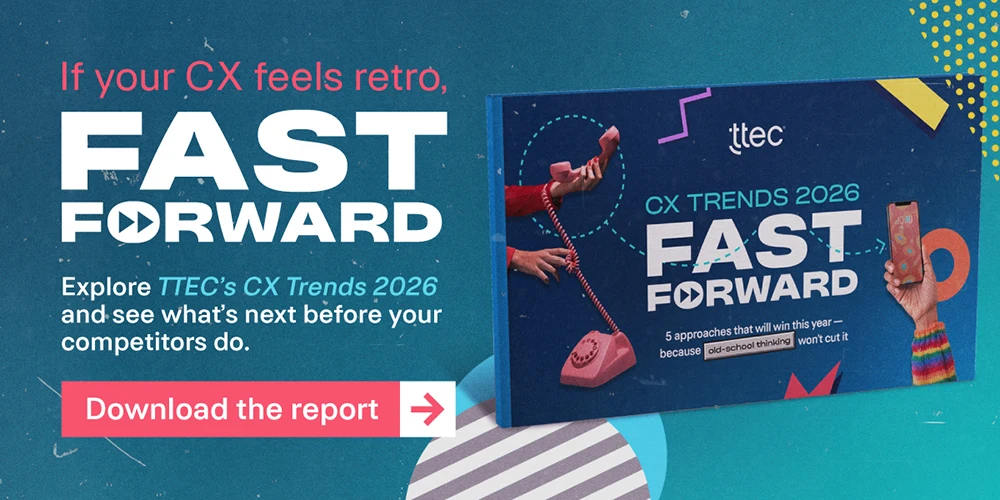There’s no overstating the importance of having high-quality contact centers. These centers are often where customers interact with a brand more directly, and their experiences can bring swift consequences: positive experiences can lead to sales and repeat business, while negative ones can turn customers off a brand for good.
Research shows 70% of shopping experiences revolve around how a person feels they are treated. In this respect, contact centers are on the front lines. But when it comes to captive centers vs. outsourced centers, which is the best way to take customer service and sales to the next level?
As a first step it is important to understand the meaning of captive center vs outsourcing. Captive centers are those that are client owned and operated and provide resources directly to their organization. The associates working in captive centers are employed by the company, not a vendor. Outsourcing, on the other hand, is a process in which an organization recruits another organization to carry out tasks, handle operations, or provide service delivery.
In this blog post we'll look at the pros and cons of captive operations vs. outsourcing models and explore five ways that outsourcing contact centers can provide your company an ideal approach to improve CX, empower employees, accelerate digital transformation, and improve contact center operational KPIs.
1. Hiring the Right People
These days, more is expected of service and sales associates than ever before. Today’s workforce must possess complex problem-solving skills, excel in people management, coordinate well with others, and have high emotional intelligence. In an era when so many simple tasks are being handled by AI, the complex problems are left to the people – so finding the right ones is key.
Finding contact center employees with the right skillset can be difficult for brands to do efficiently. At the same time, it is important to ensure all associates remain on-brand and embrace the corporate culture. An outsource partner, which has experience and expertise in this area, can take the burden off the brand so that it can focus on its core competencies and business mission.
With the right associates, everybody wins: employees feel empowered to make decisions that benefit both customers and the company, customers have positive experiences, and companies’ bottom lines will benefit as a result.
2. Becoming More Efficient
Business takes place in the global marketplace 24/7 these days, and customers expect to be able to access brands whenever it’s convenient for them. This means companies must be ready to offer support at any time, on any channel, in any language. Associates who don’t meet these expectations risk a frustrating and disconnected experience.
While this can be challenging for a captive center, a benefit of process outsourcing is that an outsource partner has resources around the world – with physical space, technology and staff at the ready for short term or long term. Partner experts and delivery centers know how to act quickly and move to the next objective. Tasks get completed faster and more efficiently, which can improve KPIs and provide cost reductions.
3. Faster and More Effective Training
When closing sales, speed and efficiency are the names of the game. An outsourcer can help you get there by training more contact center associates faster and more effectively and business processes and customer support. Well-versed in industry best practices, outsourcers are equipped to use the latest technology to boost productivity and bottom lines – like TTEC’s RealPlay Bot, which lets associates practice with and get real-time feedback from a bot that acts like an AI-powered customer.
An outsourcer can work to make sure employees are motivated and equipped with the right skills to deliver great customer service experiences during each interaction. In giving the right tools and training, they help brands build a workforce that is competent, collaborative and connected.
4. Tapping into Expertise
Too often, customer service serves a secondary function because brands are so focused on their products and services. This doesn’t bode well for those brands since, more and more, customers are looking to customer experience as a differentiator, even ahead of products and price in some cases.
The right outsource partner, on the other hand, lives and breathes customer experience. They specialize in end-to-end CX capabilities, can leverage digital and next-gen strategies, provide operations rigor, and hire and retain world-class associates who serve as brand ambassadors.
The expertise a brand may lack in-house can be found in the right partner.
5. Optimizing Digital
Not surprisingly, digital plays a strong role in contact center success. Another difference between captive centers vs. outsourced ones is that outsourcing partners can give brands the digital edge.
Customers want more digital and technology options, meaning brands must provide multiple channels of support. Not only that, but they also need to understand which channels work best for various types of interactions.
A strong grasp on AI, in particular, is becoming increasingly important; Gartner predicts that this year 15% of all customer service interactions will be completely handled by AI, a 400% percent increase since just 2017.
A captive center may make sense for organizations with low customer support volume and simple customer requests. For organizations that seek to differentiate themselves with a great customer experience, working with an experienced partner is key.
The right partner will bring expertise and tech know-how in digital channels, and balance people with technology in a cost-effective manner – all in a way that frees brands up to focus on their core business mission.
More captive center and outsourcing resources
We hope you enjoyed this blog post looking at captive centers vs. outsourcing, and five ways that an outsourcing contact center approach can help your business improve experiences and become more efficient. To learn more about choosing the right outsourcing partner, here are additional resources from our from our CX strategy and contact center outsourcing experts:

4 reasons why you should use the right CX partner for outsourcing needs : Rather than utilize captive centers, discover how to instead optimize your contact center operations with innovative collaboration. For example, an outsource partner with experience and expertise can take the burden off a brand so it can focus on its core business mission. For this reason and many others, learn in this strategy guide why it’s critical to find the right CX partner for your outsourcing needs.
Sales Outsourcing: 11 Benefits to Outsourcing Sales: Among its many benefits, sales outsourcing can help brands tap into underserved markets, leapfrog technology constraints, break out of silos, and overcome other obstacles.
4 Questions to Decide if Contact Center Outsourcing is Right for You: When done right, contact center outsourcing is an opportunity to gain specialized knowledge and resources, along with other benefits. But not every organization needs a contact center partner. Does yours?
Organizations Need Sales Outsourcing When It’s ‘All Hands on Deck’: When scalability, speed, and focus are essential, outsourcing sales is a proven way for companies to quickly acquire reinforcements while focusing on core endeavors.
Customer Experience Outsourcing: 5 signs you need it and 5 signs you don't: To help guide your business through the captive center vs. outsourcing debate, we’ve identified the top reasons not to work with an outsource partner – and the top reasons a CX outsourcing partner might be a good next step.















